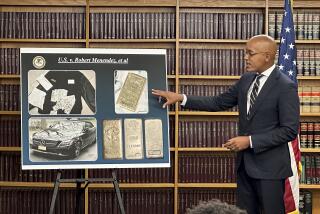Clinton Urges Egypt Leader to Step Up Reforms : Diplomacy: On visit to capital, Mubarak is warned continued U.S. aid may hinge on his efforts to open up political process.
- Share via
WASHINGTON — President Clinton told Egyptian President Hosni Mubarak on Monday that he will try to maintain the current high levels of U.S. aid to Egypt, but he delivered a veiled warning that continued aid cannot be assured indefinitely unless the Egyptian leader moves more aggressively toward political and economic reform.
Against a backdrop of the most stringent security seen in Washington in years, Clinton and Mubarak pledged to work together to further the Middle East peace process and to try to foster political reconciliation in Somalia. Clinton called Egypt one of America’s “most important global partners” and thanked Mubarak for his country’s role in helping to bring Israel and its Arab neighbors together.
But the striking thing about the otherwise friendly meeting was Clinton’s expression of concern that Mubarak is moving too slowly toward political reform and thus indirectly is feeding growing Islamic extremism that not only threatens his government but also appears to be inspiring terrorist acts beyond its borders, including in the United States.
Accordingly, security was tighter in Washington than for any recent visit by a head of state, or even the Sept. 13 signing of the peace agreement between Israel and the Palestine Liberation Organization, which brought together hundreds of dignitaries from around the globe. Pennsylvania Avenue was barricaded in front of the White House and Blair House, and special security police were posted in vans around the area.
Behind the precautions were threats, including one or more suggesting that a car bombing might be attempted, according to sources familiar with the visit. Intelligence information on one group suspected of wanting to make an attempt on Mubarak’s life is sketchy, adding to the anxiety.
“We’re not going to talk about this,” said Gayle Moore, a spokeswoman for the Secret Service. She contended that Mubarak’s decision to stay at Blair House, across Pennsylvania Avenue from the White House, rather than at the Egyptian Embassy, means “maybe we’re more visible.”
One source indicated that the precautions reflect concern stemming from the terrorist conspiracy indictment of radical Muslim Sheik Omar Abdul Rahman and 14 others brought by a federal grand jury in New York on Aug. 25.
Those charges accuse defendants of plotting the World Trade Center bombing as well as of planning terrorist acts against U.N. headquarters and an attempt to assassinate Mubarak. The U.N. bombing was to coincide with a visit to the world organization by Mubarak. Abdo Mohammed Haggag, one of the alleged plotters, was arrested in July on charges of plotting a suicide mission against Mubarak.
At a joint press conference with the Egyptian leader, Clinton said the security measures were appropriate in light of the tension surrounding the Middle East peace process. He did not refer to violent elements opposed to Mubarak within his own country.
“We consider President Mubarak a valuable asset,” Clinton said. “We just wanted to go out of our way to make sure that he felt secure here in our nation.”
Clinton said the two leaders discussed the internal security situation in Egypt, which has been plagued by a series of attacks on foreign tourists and other acts of domestic violence. Clinton said he believes that Cairo has made “marked progress” on terrorism but that it still remains a concern.
Mubarak is battling Islamic fundamentalism in his country with mass arrests, military trials in military courts, executions and repression of criticism by the political opposition.
Mubarak dismissed the question of violent extremism in Egypt, saying that his nation suffers the occasional terrorist incident but that its internal security is “far better than ever before.”
A senior Administration official said “no one is trying to underestimate the threat (of Islamic extremism in Egypt). The threat exists. The Egyptians recognize it.”
But, he said, the violence has subsided in recent weeks because of the effectiveness of Mubarak’s repressive measures and progress on economic reform.
In the press briefing, Clinton praised Mubarak’s “bold vision” for the nation’s economic future, including full employment and free markets. He pointedly reminded Mubarak that such reforms are “vital to the well-being of the people of Egypt.” Poverty and unemployment are rising in Egypt, which has one of the fastest-growing populations in the Third World.
Despite Clinton’s statement, a senior Administration official said the President had told Mubarak privately that he will exert his best efforts to continue Washington’s $2.1-billion annual foreign aid grant to Egypt but that ultimately the United States wants to see the subsidy end and Egypt achieve economic self-sufficiency.
On the Middle East peace process, Mubarak said he expects to see progress soon in talks between Israel and Syria to build on the Israel-PLO accord and an economic cooperation pact with Jordan.
Clinton was more cautious. He said Israeli public and political opinion may not be able to support peace with the Palestinians and a pact with Syria in such a brief span.
Times staff writer Ronald J. Ostrow contributed to this report.
More to Read
Sign up for Essential California
The most important California stories and recommendations in your inbox every morning.
You may occasionally receive promotional content from the Los Angeles Times.










